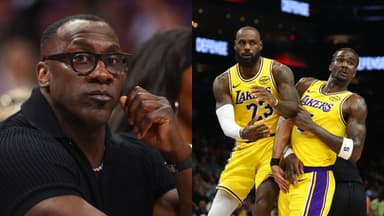Rappers and the legal system have a long-standing beef. From drug charges to possession of weapons, rappers—especially black rappers—often find themselves on the wrong side of the law.
Advertisement
A$AP Rocky just avoided a lengthy jail sentence after being acquitted of charges for two counts of felony assault with a semiautomatic handgun. His case is just the latest example of the legal hot waters rappers usually find themselves in.
So, why is this the case? Why do rappers so often find themselves not only contending with the law but also serving jail time? That’s exactly the question Shannon Sharpe had for Wallace “Wallo 267” Peeples on the latest episode of Club Shay Shay.
“Wallo 267” is an entrepreneur, social influencer, activist, and three-time TEDx speaker. He also co-hosts the Barstool Sports podcast Million Dollaz Worth of Game with his cousin and rapper Gillie Da Kid. Being this closely associated with a rapper, Wallo is uniquely equipped to answer the question.
“I think in rap, it became a challenging sport, a violent challenging sport to the point of where as though I say something- Oh, you really that. I’m challenging you. Imma see if you really a kid. That’s what came about. Sometimes we speak our own fate. Some people talk about dying like it’s cool. It’s the power of the tongue. We got to live off rap sometimes.”
So, according to Wallo, rappers often manifest their own fate by constantly singing about being in a face-off with the law; whether it is talking about guns, drugs, or other illegal activities.
Wallace also spoke from experience, having spent twenty years in and out of the prison system before restarting his life and achieving success.
He believes that, in the African-American community, rap served as a way for people to express the realities of their environment—both where they grew up and where they live now. It acts as an escape, or at least the illusion of one, allowing young artists to share their experiences and surroundings through music.
Wallo describes rap as “storytelling,” noting that many artists once spoke about violence and prison without actually engaging in crime or serving time. However, as the genre evolved, competition intensified, and lyrics started being taken literally.
Rappers began to feel threatened, leading to a culture where proving authenticity became dangerous. This shift fueled extreme violence, with young artists resorting to real-life actions to make a name for themselves.
Now Wallo 267 is trying to do his part and make a difference with his words so young guys don’t end up in prison like him.
How did Shannon Sharpe’s latest guest, Wallo 267 turn his life around?
After spending his teenage years in and out of Philadelphia’s juvenile detention system, followed by 20 years in prison for armed robbery, Wallace Peeples was released in 2017. Determined to turn his life around, he sought a new path and found his answer in digital media.
From a young age, Wallace had a natural talent for humor and a knack for making people laugh. He leveraged that charisma to build a network, draw people in, and make them listen to his message. He said,
“You understand if you can make somebody laugh, you can make them listen. Laugh ain’t got no race, no color, no age, no gender. Laughter is like only thing in the world that everybody wants. That’s one of the things we can all agree on.”
Wallo took full accountability for his past but also learned to forgive himself and those around him. Drawing inspiration from Anthony Bourdain and George Lois, he tapped into the power of social media to reinvent himself and build a platform.
In just five years, he has transformed his once-modest social media presence into a powerhouse, backed by a network of pro athletes, music industry icons, actors, entertainers, and business leaders. Today, he reaches over 21 million people weekly through social media impressions.
Beyond his digital success, Wallo serves as the Chief Marketing Officer of REFORM Alliance, an organization committed to transforming the probation and parole system.
His journey proves that anyone can turn their life around—if they’re willing to put in the work, embrace accountability, and commit to learning without seeking shortcuts.





![Shannon Sharpe [Left]; Sterling Sharpe [Right]](https://cdn-wp.thesportsrush.com/2024/12/6ac68b98-untitled-design-216.jpg?format=auto&w=384&q=75)


